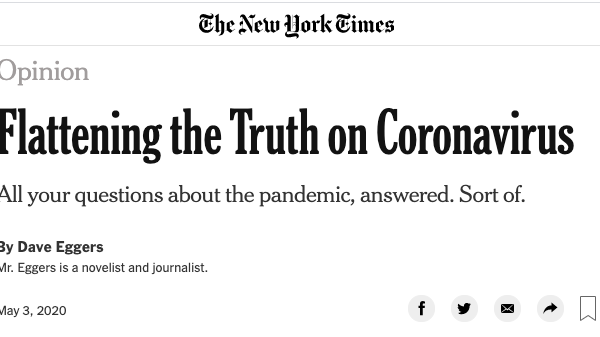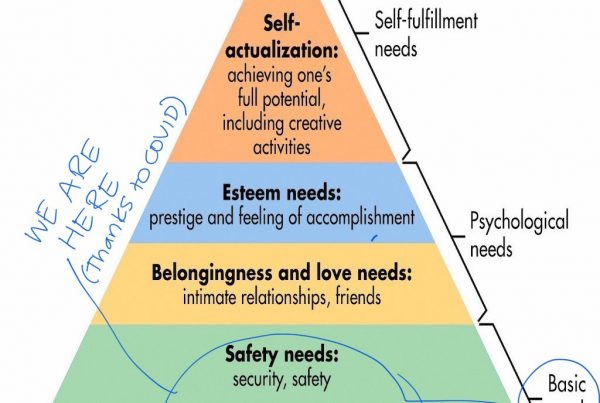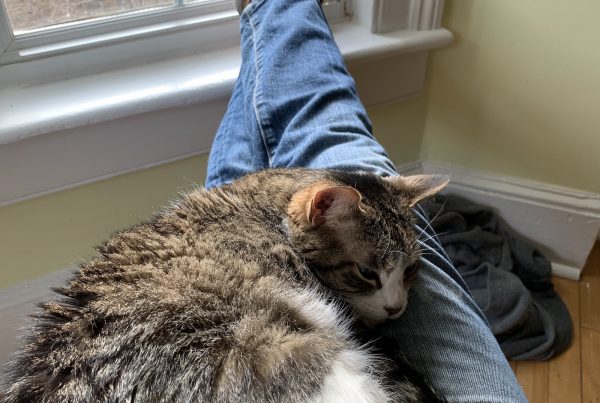Last week, I got a voice text. Or whatever they’re called. You know, the thing that shows up in your text message as a voice mail. In general, I prefer getting voice mails to my voice mail and text messages to my text messages, primarily because the tech world has figured out how to transcribe voice mails. But this isn’t really the point here.
The voice text was from a friend who is very enthusiastic and kind but doesn’t always follow things through. I’m sure you have one like him. Amazing ideas and excitement, and then you’re never sure if any of those ideas or excitement will result in an actual thing. This is my way of saying that I’m always up for a fun dinner or outing with this friend, but a little wary of a daytime “I’ve got an amazing idea!”
To be clear, this is primarily because I have been having a really hard time lately getting my own work done lately so I don’t have a great deal of energy for someone else’s unfinished ideas.
This particular voice text was an introduction to an unknown phone number for no clear purpose. I was feeling optimistic that day, so I decided to give his introduction a chance and reached out to the unknown phone number sharing my willingness to jump on the phone.
A couple days ago, this phone call happened, and it’s taken me 36 hours to calm down enough to write about it.
“Hi, how are you?” Says I.
“Great, you?”
“Really well, thank you.”
Pause. More small talk. I’m trying to figure out why we’re on the phone together without asking her, but she’s not helping much. So I go blunt.
“I’m always delighted to make new acquaintances,” I said, lying through my teeth. I’m an introvert. I hate making new acquaintances. Especially when I have an office to reorganize to help me through writer’s block. “But why do you think Larry” (not his real name) “thought we should meet?”
“Oh, probably because I was diagnosed with breast cancer two months ago.”
I stop and take a deep breath and a quick inventory of my emotions: empathy for this lovely woman and a quick and sudden rage toward Larry for putting me into this situation without permission and without warning. More on that in a minute. I start with the person in front of me.
“Oh my goodness, I’m so sorry. What a diagnosis. How’s it going?”
“Pretty good…” and off she went, with her specific diagnosis and treatment and the name of her doctor, using the short-hand that people in the cancer world all use.
The problem here is that the cancer world is so big that not everyone knows all of the shorthand. Like in this case, I know absolutely nothing about breast cancer because my experience was with non-Hodgkin’s lymphoma. (I barely know anything about the details of Hodgkin’s lymphoma, and my sister has been living with it for 13 years.) The similarities are like saying that because I’ve broken my wrist, I know what’s it’s like to have ankle surgery. I understand what it’s like to be in the hospital with a broken bone, sure, but I know nothing about what it’s like to be on crutches or to wear a boot or to do physical therapy for an ankle instead of a wrist. In fact, in this case, the similarities are even fewer.
I try to explain this to her without sounding like I don’t care about her particular situation. I’m not sure I succeed. So I think back to my own time when I was in her shoes. I can barely remember it. Not the moments, but my brain musings. I have worked so hard to stay present and stop planning around the unknown (I mean, I wrote an entire book about that particular process) that it sometimes is hard to even remember how my brain worked back when I thought I could plan for the unknowable. But I do remember what the panic of not knowing felt like. So I wrangle myself and take a deep breath, trying to find something to give her to do so she can feel like she’s “winning” her treatment. I remember my own desire for my experience to be better because I was better than the average, and my rage melts slightly in the face of this.
I explain to her that chemotherapy is killing her cancer but also doing major damage to the rest of her body but there’s hope! Because there’s all sorts of things that she can do about it during treatment. She didn’t know that chemotherapy is damaging the rest of her body. So I swallow my annoyance at her doctors at Sloan Kettering for not explaining it to her in a way that she could hear and start giving her a lecture on cancer and inflammation and gut health and cellular decay and building a team of experts and support.
And then I suddenly realized that I was giving her a master class in being a successful cancer patient and balancing body desires versus brain desires and literally all the things I wrote about in my book and my rage at Larry reached a new height for not just giving her my book instead of putting her on the phone with me while I stumble through advice I feel like I’ve already provided in a very easy medium to consume. While I was managing this new level of anger inside my own head, she explained to me that she was actually pretty proud of the fact that she hadn’t changed her life at all in the face of her diagnosis and treatment. She was still working full-time with all of her pre-chemo dietary restrictions and activity levels despite the fact that was really tired. And I almost burst into tears as I could just hear her body screaming for relief.
“Oh my god. Please give yourself a break. Please eat healthy carbs. Please stop trying to prevent your hair from falling out. Please take a day or two off of work to rest. Please go for a walk instead of a boot camp class. Please start listening to your body and what it needs right now. Please stop pretending like your life hasn’t changed. Please, for your body’s sake, please.”
She’s quiet. We say a few more things to each other and then get off the phone.
And then my rage at Larry EXPLODED. I stormed down the stairs to find an outlet for it, found Michael quietly working in the den, and just yelled for five minutes. Afterwards, he blinked, shook himself off, and suggested we go to the gym.
As I yanked dumbbells off the rack and balanced on a Bosu, I ticked through all the reasons I was furious with Larry.
- He didn’t ask me about the introduction before he made it.
- He didn’t warn me why he was making the introduction.
- He assumed that a personal introduction to me was of more use than just showing her my blog or giving her my book.
- He assumed that my time was better spent talking about something I know nothing about (breast cancer) with someone I don’t know than any of the other 5,000 things I want to do that I’m not getting done.
And then my rage towards Larry reached it’s pinnacle, because I realized that I hadn’t trained him how to be a good friend to people who have been diagnosed with cancer. (See what I did there? It’s so much easier to be mad at someone else than at myself. [More on this here.] Though I am going to talk to him about cold introductions and voice texts. And since my rage has dissipated, I’ve realized that Larry probably did this cold introduction for a variety of reasons that I explore over here.)
So, folks, here’s what to do when a friend of yours is diagnosed with cancer.
- Don’t immediately introduce them to your other friends who’ve gone through cancer. Honestly, we’re not that helpful. Most of us aren’t trained as therapists and most likely we haven’t gone through the same treatment, so we’re neither good for the brain nor for the body.
- Introduce them to Imerman’s Angels to get them a mentor. This organization connects fighters with survivors of the same age, gender, diagnosis, and treatment. These angels are WAY more helpful to current patients than “my friend who’s had cancer” because of all the aforementioned ways that not all cancers and treatments are the same.
- In addition to Imerman’s Angels, suggest that they reach out to a disease-specific organization like the Leukemia and Lymphoma Society. They know a lot more about how to help someone going through their particular version of cancer than, say, I do.
- If you like my approach to the whole thing, share my blog. Start with the blog post on “What to do when a doctor says cancer.” Be careful about my book. Sometimes it’s a lot for someone who’s currently going through cancer treatment to read about someone else’s process. Definitely share my book with other friends who are caregiving, but just be careful about current patients. Weigh their personality with the likelihood of their survival and go from there. (I know that sounds callus, but sometimes that’s the equation that we’re dealing with when it comes to illness.)
- After that, just be there for them. Listen to their worries. Never say “at least…” (“At least you harvested your eggs,” is never the appropriate response to “I’m worried about my fertility.”) Watch this video about empathy versus sympathy. Be empathetic, not sympathetic.
- I just realized that I’m assuming you’ve read my book. If you haven’t, read my book!
And now I’m going to write this lovely breast cancer patient a note wishing her luck and apologizing for not being prepared for the conversation and for any unnecessary anxiety I may have caused through my clumsy words.




[…] Back in October, I posted a piece about how my friend Larry introduced me to a woman going through breast cancer treatment with no warning or permission. You can read all about how that went here. […]
[…] trilogy that I started in October. If you’re curious, you can see how the whole thing began here. And continued here. But you don’t need to have read what I wrote then to know what’s going on […]